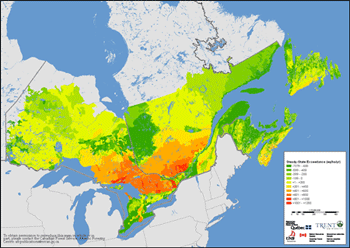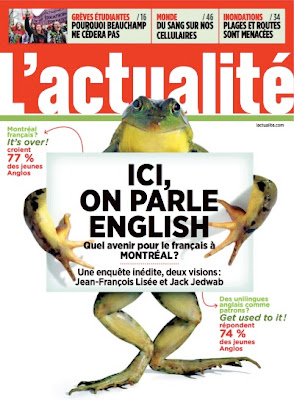From the big scrapbook of time, here’s a look at Canada in
1988—
January 2: Prime Minister Mulroney and US President
Ronald Reagan sign the Free Trade Deal. Now it must pass the House of Commons
and get through the US Congress as well before it becomes law. If ratified, the
treaty will be phased in over a ten-year period.
 |
| Acid rain affects much of the forestland in central and Atlantic Canada. |
January 11: External Affairs
Minister Joe Clark meets with US secretary of State to discuss acid rain.
George Schultz claims Canada is making the issue appear worse than it really
is.
January 15: More than 10,000
Canadians have tested positive for the AIDS virus, according to a survey
conducted of provincial health laboratories.
 |
| January 28: The Supreme Court of strikes down the abortion law, ruling that free access to abortion is a woman’s right. |
 |
| The RCMP perform their famed Musical Ride at the opening of the Winter Olympics. |
February 13: Her Excellency,
Governor General Jeanne Sauvé, is on hand to open the XV Olympic Winter Games
in Calgary.
February 25: The Supreme Court of
Canada rules that Saskatchewan must either translate its laws into French and
permit French to be used in the legislature and the courts.
 |
| The flag is lowered in Calgary for the last time as the Olympic torch passes to Albertville, France for the XVI Winter Olympiad. |
February 28: The Olympic Games
are over. After sixteen days of glory, Canada has taken home more medals than any other country but no gold.
Brian Orser and Elizabeth Manley have captured silver.
March 1: The chair of the Olympic
Organizing committee tells the press the Calgary Olympic Games earned an unprecedented
$32 million in profit.
 |
| Hydro-Quebec's headquarters are on Boulevard Rene-Levesque in Montreal. |
March 8: Quebec Premier Robert
Bourassa announces Phase II of the James Bay hydroelectricity project by utility giant Hydro-Quebec. The cost
will be $7.5 billion and the resulting dams will generate 2,500 megawatts of
power. Most of the surplus hydro will be sold to New York, Vermont and Maine who expect
delivery in 1995.
March 22: It’s Genie night and Un Zoo la Nuit captures 13 Genie Awards.
The gripping story about a son’s love for his father will become a film
classic.
 |
| Kurt Browning's figure skates that he wore at the championships in Budapest. |
March 25: Kurt Browning becomes
the first person in the world to execute a quadruple jump at the world figure
skating championships in Budapest.
 |
| The first Canadian-built Honda Civic is decked out for the occasion. |
April: Civic production begins at the Honda plant in
Alliston, Ontario. The $280 million
factory only opened a year ago.
April 1: Robert Campeau purchases
the Federated Department Stores for $6.64 billion. It’s the biggest business
deal ever cut by a Canadian business mogul. FDS is the holding company for Macy's, Bloomingdale's and Marshall Fields--all high-end retail shops in the United States.
 |
| The flag of Saint-Pierre & Miquelon. |
April 18: France recalls its ambassador to Canada after
the fishing vessel Croix de Lorraine
is seized for fishing in Canadian waters. Both countries claim jurisdiction
over waters off the coast of Newfoundland and the French Department of Saint-Pierre & Miquelon, located 20 kilometres off the coast of Newfoundland.
April 12: The Tory government
tables legislation in the House of Commons to sell 45 per cent of Air Canada's
shares to the public. The remainder of the Crown corporation’s stocks are to be
sold at a later--unspecified date.
 |
| The HMCS Halifax in 2009. |
April 30: The HMCS
Halifax is launched in Saint John, New Brunswick. The 4,750-tonne frigate
will still be on active duty in 2013.
May 18: Ryan Cooley is born in
Orangeville, Ontario. He will grow up to be an actor, best known for his
character JT Yorke, in Degrassi: The Next
Generation, aired on CTV here at home and around the world as well.
May 21: The National Gallery of Canada opens in
Ottawa. The stunningly beautiful glass and granite building was designed by famed architect Moishe
Safdie.
 |
| Wayne Gretzky hoists the Stanley Cup. |
May 26: Lord Stanley’s Cup goes
home with the Edmonton Oilers after they knock the socks off the Boston Bruins
in four games. This is the Oilers' third win in four years.
 |
| May 28: The aerosol industry announces a voluntary ban on adding chloro-fluorocarbons to spray cans. Scientists have proven that CFCs destroy the ozone layer. |
 |
| Export A is one of the nation's best-selling cigarette brands. Macdonald Tobacco Limited is based in Quebec City. |
May 31: Parliament decrees that
the tobacco industry must begin to phase out advertising.
June 1: There is trouble in
Kahnawake, Quebec as 200 Mounties, armed with submachine guns, raid stores on
the First Nations reserve. The RCMP is looking for nearly $500,000 worth of smuggled
cigarettes.
June 6: The Supreme Court
overturns the conviction of Jim Keegstra. The one time teacher and mayor
Eckville, Alberta was convicted of teaching children that the Holocaust didn’t
happen and that Jews influenced world events through an evil conspiracy. The
Supreme Court ruled that the Criminal Code under which Keegstra was charged
violated his right so free speech under the Charter of Rights and Freedoms.
June 7: Michael Austin Cera is
born in Brampton, Ontario. He will grow up to be an actor appearing in such TV
shows as Tom Goes to the Mayor and Arrested Development. He will also be
the voice of Brother Bear in the Berenstain
Bears cartoon series.
 |
| The Churchill Falls hydro-electricty complex is the third largest in North America. |
June 9: The Supreme Court of
Canada denies Newfoundland's 12-year legal pursuit to renegotiate a fairer
contract with Quebec for the hydro-electric power that comes from Churchill
Falls in Labrador.
July 21: Parliament replaces the
War Measures Act with an up-to-date Emergencies Act.
 |
August 9: Wayne Gretzky is traded to the Los Angeles Kings in what may be the biggest deal ever made in hockey. |
September 2: Statistics Canada
reports the wheat harvest will be off by more than 40 percent as a result of
this summer’s drought.
September 21: Ottawa will
compensate the 21,800 Japanese Canadians who were forcibly evacuated from sensitive
areas—particularly along the West Coast—during World War Two.
September 24: Ben Johnson is the
fastest human being in the world, winning gold for Canada after running the
100-metre dash at the Seoul Olympics in 9.79 seconds.
September 24: Barry Phillip
Nichol is dead at the age of 43. The poet went by the name bpNichol—no
spaces—and completely changed the way we think about poetry. He was a co-writer of the popular CBC-TV kids’
show Fraggle Rock. His best known
work is The cosmic chef.
September 27: Ben Johnson is
stripped of his gold medal when he tests positive for illegal drugs.
September 30: In St. John’s,
Newfoundland, Father James Hickey is sentenced to five years in prison for
assaulting boys and young men. The press hints that this is just the tip of the
iceberg and more priests will soon be charged with sexual assault.
 |
| The United Nations' Security Council Chamber. |
October 26: Canada is elected to a seat on the UN
Security Council.
 |
| The 18th Prime Minister will publish his Memoirs in 2007. |
November 21: The voters have
spoken. The Right Honourable Brian Mulroney and his Progressive Conservative Party are returned to power in today’s
election.
 |
| November 27: The Grey Cup is the property of the Winnipeg Blue Bombers after they down the BC Lions 22 to 21. |
December-- The MacDonald Tunnel is complete. The
35.5-kilometre long engineering marvel burrows under Mt. MacDonald and Mt.
Cheops and through the infamous Rogers Pass in the Rocky Mountains. The cost of
the project was $500 million.
December 15: The Supreme Court of
Canada rules that Quebec’s French-only language laws are illegal. Premier
Bourassa threatens to use the ‘notwithstanding’ clause of Charter of Right to
make sure only French is used in Quebec.
December 18: Some 12,000 people
jam the Paul Sauvé Arena in Montreal and another 6,000 stand outside in the
bitter cold to support Bill 101 and a French-only Quebec.
 |
| The Canadian Auto Workers represents most of the people who build our vehicles. |
December 31: Auto workers in this country have built
1,976,896 cars and trucks during the calendar year—the highest number ever.
All rights reserved.












-image.jpg)
















































